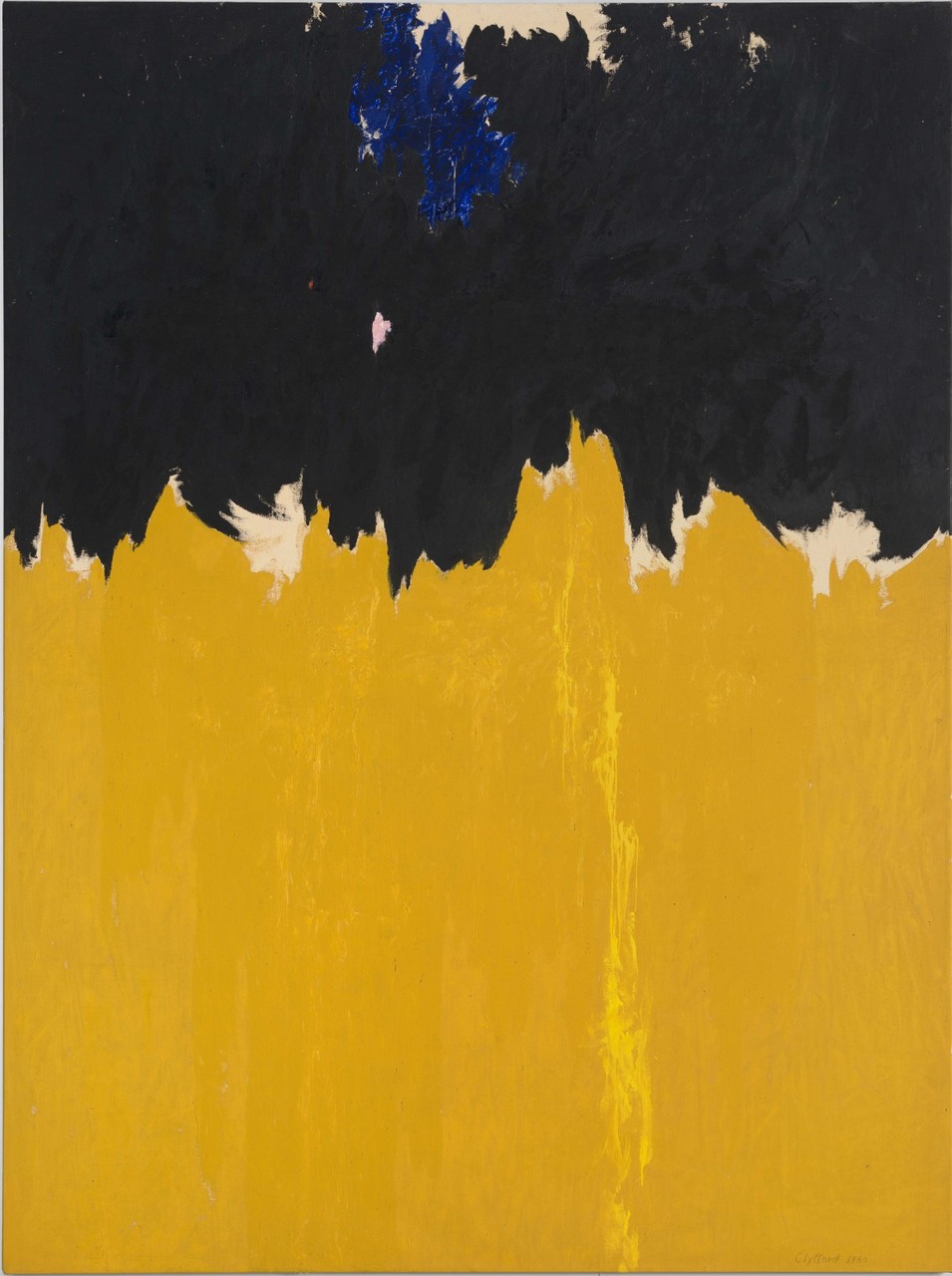Abstract Expressionism
03 Feb - 04 Jun 2017

Clyfford Still
PH-950, 1950
Oil on canvas, 233.7 x 177.8 cm
Courtesy Clyfford Still Museum, Denver, Colorado
© City and County of Denver, VEGAP, Bilbao, 2016
PH-950, 1950
Oil on canvas, 233.7 x 177.8 cm
Courtesy Clyfford Still Museum, Denver, Colorado
© City and County of Denver, VEGAP, Bilbao, 2016
ABSTRACT EXPRESSIONISM
3 February – 4 June 2017
Curators: David Anfam, Edith Devaney, and Lucía Agirre
Unlike the other key 20th–century artistic movements, Cubism and Surrealism, which predated it, Abstract Expressionism refuses to be bound by any formula and is instead a celebration of individual diversity and freedom.
Mostly colossal canvasses, some of these works are intense, expressive, and spontaneous, while others are contemplative, yet they all redefined the nature of painting.
In Jackson Pollock’s words, “Abstract painting is abstract. It confronts you.” The artists express their emotions and convey their presence through the works, but the observer’s perception is what brings them full circle.
The Guggenheim Museum Bilbao presents Abstract Expressionism, an ambitious selection of works by the artists who spearheaded a major shift and new apogee in painting in New York which began in the 1940’s. Jackson Pollock, Mark Rothko, Willem de Kooning, Robert Motherwell, David Smith, and Clyfford Still are just some of the artists in the show, which brings together more than 130 paintings, drawings, sculptures, and photographs from public and private collections all over the world. This exhibition sheds new light on Abstract Expressionism, a diverse, complex, and multifaceted phenomenon which is often erroneously viewed as a unified whole. The presentation in Bilbao has been made possible thanks to the generous sponsorship of Fundación BBVA, and with support from the Terra Foundation for American Art.
Back in the years of free jazz and the poetry of the Beat generation, with the Second World War as the backdrop, a group of artists broke with the established conventions and ushered in a movement which was born of a shared artistic and life experience, even though they each had their own style. Unlike the Cubism and Surrealism which predated it, Abstract Expressionism refuses to be bound by any formula and is instead a celebration of individual diversity and freedom of expression.
Characteristics of this movement include works on a colossal scale which are sometimes intense, spontaneous, and extraordinarily expressive, while other times they are more contemplative through the use of vast color fields. These creations redefined the nature of painting and aspired not only to be admired from afar but also to be enjoyed in two-way encounters between the artist and the viewer. Just as the artists express their emotions and convey the sense that these emotions are brought into the work, the viewer’s perception is the last step in this interaction. Thus, “Abstract painting is abstract. If confronts you,” as Jackson Pollock stated in 1950. Furthermore, the intensity of this encounter could be further accentuated by the way the works are displayed, as exemplified in the Rothko Chapel in Houston.
3 February – 4 June 2017
Curators: David Anfam, Edith Devaney, and Lucía Agirre
Unlike the other key 20th–century artistic movements, Cubism and Surrealism, which predated it, Abstract Expressionism refuses to be bound by any formula and is instead a celebration of individual diversity and freedom.
Mostly colossal canvasses, some of these works are intense, expressive, and spontaneous, while others are contemplative, yet they all redefined the nature of painting.
In Jackson Pollock’s words, “Abstract painting is abstract. It confronts you.” The artists express their emotions and convey their presence through the works, but the observer’s perception is what brings them full circle.
The Guggenheim Museum Bilbao presents Abstract Expressionism, an ambitious selection of works by the artists who spearheaded a major shift and new apogee in painting in New York which began in the 1940’s. Jackson Pollock, Mark Rothko, Willem de Kooning, Robert Motherwell, David Smith, and Clyfford Still are just some of the artists in the show, which brings together more than 130 paintings, drawings, sculptures, and photographs from public and private collections all over the world. This exhibition sheds new light on Abstract Expressionism, a diverse, complex, and multifaceted phenomenon which is often erroneously viewed as a unified whole. The presentation in Bilbao has been made possible thanks to the generous sponsorship of Fundación BBVA, and with support from the Terra Foundation for American Art.
Back in the years of free jazz and the poetry of the Beat generation, with the Second World War as the backdrop, a group of artists broke with the established conventions and ushered in a movement which was born of a shared artistic and life experience, even though they each had their own style. Unlike the Cubism and Surrealism which predated it, Abstract Expressionism refuses to be bound by any formula and is instead a celebration of individual diversity and freedom of expression.
Characteristics of this movement include works on a colossal scale which are sometimes intense, spontaneous, and extraordinarily expressive, while other times they are more contemplative through the use of vast color fields. These creations redefined the nature of painting and aspired not only to be admired from afar but also to be enjoyed in two-way encounters between the artist and the viewer. Just as the artists express their emotions and convey the sense that these emotions are brought into the work, the viewer’s perception is the last step in this interaction. Thus, “Abstract painting is abstract. If confronts you,” as Jackson Pollock stated in 1950. Furthermore, the intensity of this encounter could be further accentuated by the way the works are displayed, as exemplified in the Rothko Chapel in Houston.
